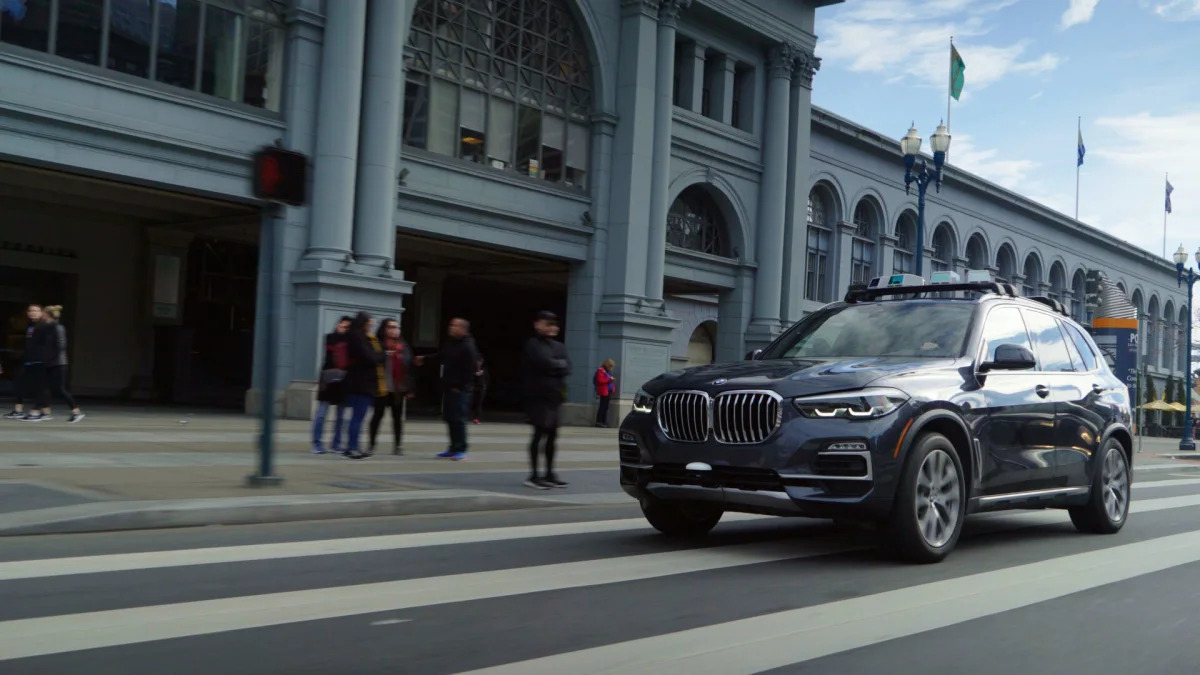Everybody thinks they have "the solution" that is going to bring fully autonomous cars into the mainstream. We can guess all day long on the who and when, but it's nearly impossible to predict that future. What we can do is take a look at some technology that might bring us closer to said future: Frequency Modulated Continuous Wave lidar.
But wait, don't let your eyes glaze over yet. We got a demo from one of the few companies touting this new tech, and it's really quite something. Called FMCW lidar for short, here's why it's better than traditional "time of flight" lidar: Longer range of sight; more reliable in adverse weather conditions; and it has the ability to better distinguish between certain shapes from a greater distance. Whereas the lidar systems on the market today are able to see about 100 meters ahead, FMCW lidar consistently sees 200 meters out. Unobstructed, the Blackmore system we demoed can see about 450 meters out. Of course, the further out you can see, the better. Other lidar systems struggle in conditions like excessively bright sunlight, but this tech does not.
That's all great stuff, but FMCW does not benefit from industry-wide adoption at this point. In fact, Blackmore is one of the only companies that are developing it along with Strobe and Aeva. GM happened to acquire Strobe a year and a half ago, but Blackmore is still independent. We went for a ride in a 2019 BMW X5 equipped with both Blackmore's FMCW lidar and traditional lidar units. The FMCW lidar was able to produce far more detailed images of what was going on in front of the vehicle in real time, whereas traditional lidar didn't reach as far, and made everything look like blobs instead of actual objects. We aren't lidar engineers, but it stands to reason that being able to identify objects further out, know their velocities and not be affected by other lidar and weather are all wins.
Interestingly enough, Blackmore is based in Bozeman, Mont. That wasn't the first place we'd guess a lidar company would be based out of (Silicon Valley seems the first choice), but they're happy to be out there. We can't tell you if or when FMCW will ever come to cars, but we do know it'll have to get a whole lot cheaper. Each unit from Blackmore costs $20,000, but lidar prices are expected to drop with scale. For now, it's a risky bet by the companies pursuing FMCW, but we'll be following along in the years to come to see if it ever pays off for them.
Related video:
But wait, don't let your eyes glaze over yet. We got a demo from one of the few companies touting this new tech, and it's really quite something. Called FMCW lidar for short, here's why it's better than traditional "time of flight" lidar: Longer range of sight; more reliable in adverse weather conditions; and it has the ability to better distinguish between certain shapes from a greater distance. Whereas the lidar systems on the market today are able to see about 100 meters ahead, FMCW lidar consistently sees 200 meters out. Unobstructed, the Blackmore system we demoed can see about 450 meters out. Of course, the further out you can see, the better. Other lidar systems struggle in conditions like excessively bright sunlight, but this tech does not.
That's all great stuff, but FMCW does not benefit from industry-wide adoption at this point. In fact, Blackmore is one of the only companies that are developing it along with Strobe and Aeva. GM happened to acquire Strobe a year and a half ago, but Blackmore is still independent. We went for a ride in a 2019 BMW X5 equipped with both Blackmore's FMCW lidar and traditional lidar units. The FMCW lidar was able to produce far more detailed images of what was going on in front of the vehicle in real time, whereas traditional lidar didn't reach as far, and made everything look like blobs instead of actual objects. We aren't lidar engineers, but it stands to reason that being able to identify objects further out, know their velocities and not be affected by other lidar and weather are all wins.
Interestingly enough, Blackmore is based in Bozeman, Mont. That wasn't the first place we'd guess a lidar company would be based out of (Silicon Valley seems the first choice), but they're happy to be out there. We can't tell you if or when FMCW will ever come to cars, but we do know it'll have to get a whole lot cheaper. Each unit from Blackmore costs $20,000, but lidar prices are expected to drop with scale. For now, it's a risky bet by the companies pursuing FMCW, but we'll be following along in the years to come to see if it ever pays off for them.
Related video:





Sign in to post
Please sign in to leave a comment.
Continue